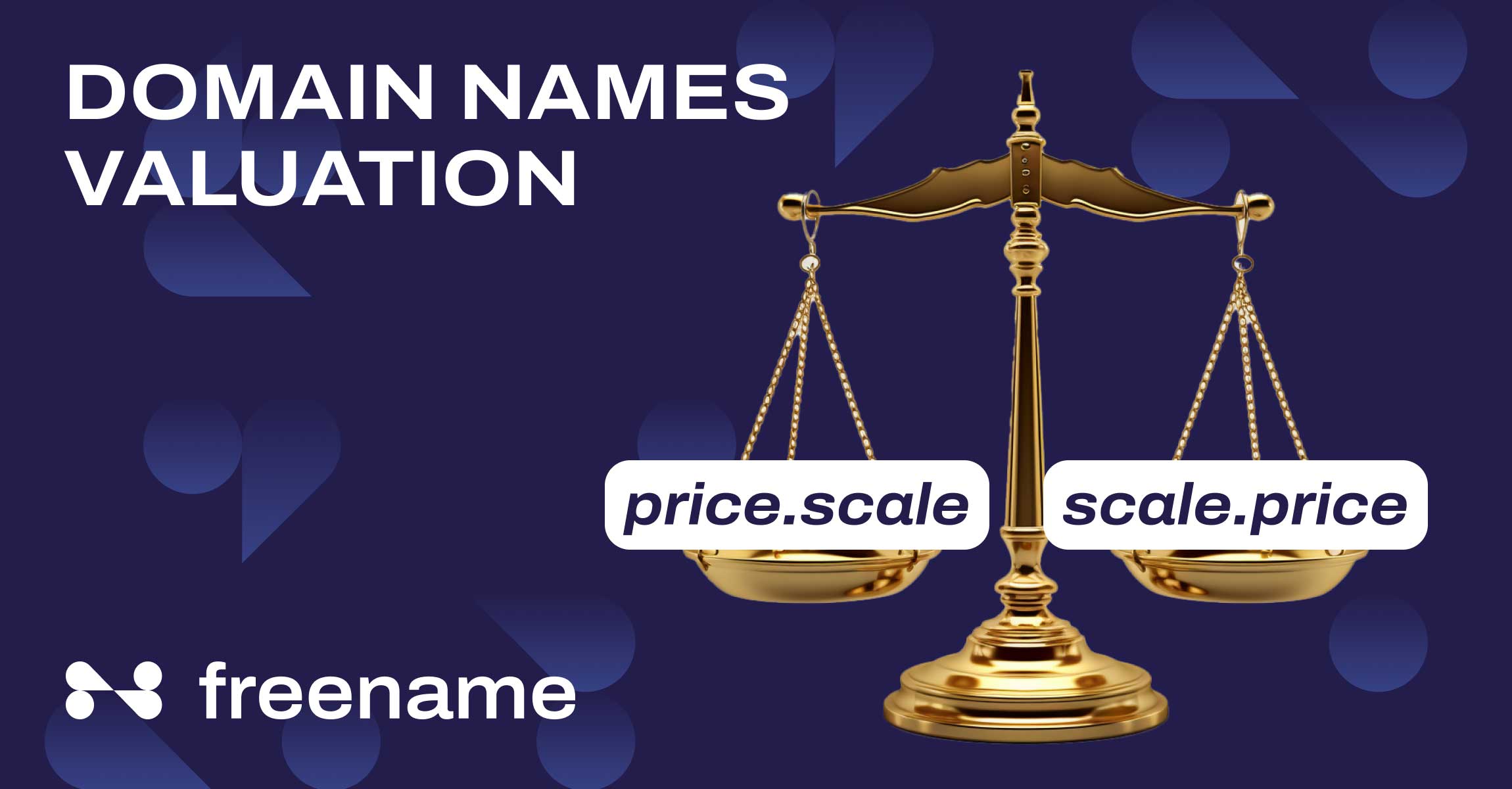How to Determine A Domain’s Name Value
Ever stumbled upon stories where domain names sell for eye-watering sums? It might leave you scratching your head, wondering how a few words combined with a “.com” or “.net” can rake in such wealth. The secret isn’t as complex as you might think. The worth of a domain name often surpasses expectations, reaching surprisingly high values.
Understanding a domain’s name value isn’t straightforward, but certain factors play a significant role. These factors are key whether you’re evaluating the potential goldmine you own or considering the leap into domain investment, particularly with the emerging Web3 space.
The Ingredients of a Valuable Domain Name
Let’s demystify this: A domain’s name value isn’t just what you think it’s worth; it’s heavily influenced by market dynamics and specific metrics that domain investors keep their eyes on. Whether you’re holding onto potential digital real estate or contemplating diving into the domain investment pool, understanding these elements can guide you towards making informed decisions in the lucrative world of domains.
Brandability
The cornerstone of a domain’s value is its brandability. Take ‘apple.com’ — its value skyrockets over ‘jackfruit.com’ purely because of Apple’s brand recognition. Domains related to big names like Samsung, Nokia, and Nike, or even clever phrase domains that have potential for branding, like ‘explainmelike6.com’, command higher prices. It’s all about the power to resonate and stand out.
Popularity and Traffic
Domains aren’t just about the name; their value significantly hinges on search traffic and popularity. A domain that garners a lot of search interest or comes with a built-in audience offers immediate value to buyers. This aspect is also a boon for SEO, making such domains even more attractive to potential owners.
Domain Extension
The tail end of a domain, its extension, plays a crucial role in its valuation. Traditionally, .com domains hold the crown in Web2, but the emergence of Web3 has broadened the horizon with new, trendy extensions, adding a layer of intrigue and value differentiation.
Future Growth Outlook
Investors with a keen eye for future trends may pay premiums for domains they believe will become popular. The staggering valuation of ‘cars.com’ at $872 million is a testament to this foresight.
Demand
At its core, the domain market operates on supply and demand. High demand drives up prices, often leading to bidding wars that culminate in domains selling to the highest bidder.
Assessing a Domain’s Name Value: Web2 Strategies and Web3 Innovations
Evaluating the a domain name’s value is more of an art than a science, with no one-size-fits-all formula. However, by adhering to established best practices, you can gain a clearer understanding of your domain’s potential value. Additionally, the emergence of Web3 technologies is revolutionizing how domain values are perceived and assessed.
Traditional Methods for Domain Valuation
- Comparative Market Analysis
One of the most effective ways to gauge a domain’s value is by examining the sale prices of similar domains. This involves researching recent sales and listings that match in terms of keyword relevance, domain length, and industry focus. Such data can provide a benchmark for what the market is willing to pay. - Active Engagement and Offer Review
Listing your domain on reputable platforms and actively reviewing incoming offers can also offer insights into its market value. Regular interaction with potential buyers helps you understand demand and adjust expectations accordingly. - Utilizing Domain Appraisal Services
Professional domain appraisal services can offer an expert perspective on a domain’s name value. These services analyze various factors, including traffic data, keyword analysis, and overall market trends, to provide a more nuanced valuation.
The Impact of Web3 on Domain Valuation
Web3, with its decentralized nature, introduces a new paradigm in domain valuation and ownership. Here’s how it’s changing the game:
- Blockchain-Based Domains
Domains on blockchain (e.g., .crypto, .eth) are not just addresses but assets on the blockchain, offering both a web presence and a potential investment. Their value is not only in their name but also in their utility within the Web3 ecosystem, such as facilitating cryptocurrency transactions and hosting decentralized websites. - Decentralized Ownership and Transfer
Web3 domains are owned outright by the purchaser, without the need for a central registry. This direct ownership model can increase a domain’s value due to the enhanced security, privacy, and control it offers. Additionally, the ease of transfer and sale through smart contracts can make these domains more liquid and potentially more valuable. - NFT Integration
Many Web3 domains are also NFTs (Non-Fungible Tokens), which means their ownership is recorded on the blockchain. This integration can add value by providing verifiable scarcity, provenance, and the potential for unique attributes or benefits associated with the domain/NFT. - Emerging Use Cases
As the Web3 space evolves, so too do the use cases for blockchain-based domains. From serving as a digital identity across decentralized applications (dApps) to enabling secure, peer-to-peer transactions, the utility of these domains continues to grow. This expanding functionality can significantly impact their value.
Embracing Change In Domains’ Name Value
The high selling prices of domain names highlight their significant value in the digital marketplace, driven by factors like brandability, traffic, and domain extensions. As we transition from the Web2 era to to Web3, the approach to determining a domain’s value is undergoing a fundamental shift.
In the Web2 framework, a domain’s name value is traditionally influenced by a domain’s commercial potential and its ability to rank well in search engines. However, Web3 introduces a new evaluation paradigm centered around blockchain technology, decentralization, and the tokenization of domains as NFTs. This shift not only adds layers of utility and security to domains but also positions them as integral assets within the decentralized web.
Web3 domains stand out for their decentralized ownership, enhanced security, and multifunctionality, extending their value beyond traditional metrics to include their role in facilitating transactions, hosting applications, and establishing digital identities. This broader utility, combined with the scarcity and authenticity provided by NFT technology, is reshaping how we assess domain value.
The future of domain valuation looks promising, filled with opportunities for innovation and investment. The move from Web2 to Web3 doesn’t just change the technical underpinnings of the internet; it challenges us to rethink what makes a domain valuable. For those looking to explore the domain market, understanding and adapting to these new valuation criteria will be key to success.







